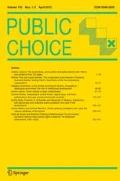Abstract
We construct models of the endogenous formation of politicalgroups designed to capture some of the key features ofpolitical and social conflict. We draw on the `citizencandidate' approach and consider both instrumental andexpressive approaches to understanding group formation andconflict between groups. We argue that the inclusion ofexpressive elements into the analysis of political groupsprovides both new insights and a better fit with certainaspects of the realities of political conflict.
Similar content being viewed by others
References
Akerlof, G.A. and Kranton, R.E. (2000). Economics and identity. Quarterly Journal of Economics 115: 715–753.
Besley, T. and Coate, S. (1997). An economic model of representative democracy. Quarterly Journal of Economics 112: 85–114.
Brennan, G. and Hamlin, A. (1998). Expressive voting and electoral equilibrium. Public Choice 95: 149–175.
Brennan, G. and Hamlin, A. (1999). On political representation. British Journal of Political Science 29: 109–127.
Brennan, G. and Hamlin, A. (2000). Democratic devices and desires. Cambridge: Cambridge University Press.
Brennan, G. and Lomasky, L. (1993). Democracy and decision. Cambridge: Cambridge University Press.
Demsetz, H. (1990). Amenity potential, indivisibilities and political competition. In J.E. Alt and K.A. Shepsle (Eds.), Perspectives on positive political economy, Ch. 5. Cambridge: Cambridge University Press.
Downs, A. (1957). An economic theory of democracy. New York: Harper and Row.
Garfinkel, M.R. and Skaperdas, S. (Eds.) (1996). The political economy of conflict and appropriation. Cambridge: Cambridge University Press.
Hamlin, A. and Hjortland, M. (2000). Proportional representation with citizen candidates. Public Choice 103: 205–230.
Hardin, R. (1995). One for all: The logic of group conflict. Princeton: Princeton University Press.
Hirshleifer, J. (1988). The analytics of continuing conflict. Synthese 76: 201–233.
Hirshleifer, J. (1995). Theorizing about conflict. In K. Hartley and T. Sandler (Eds.), Handbook of defense economics, Vol. 1, Ch. 7. Amsterdam: Elsevier Science.
Kuran, T. (1995). Private truths, public lies: The social consequences of preference falsification. Cambridge, MA: Harvard University Press.
Osborne, M.J. and Slivinski, A. (1996). A model of political competition with citizen candidates. Quarterly Journal of Economics 111: 65–96.
Schelling, T. (1978). Micromotives and macrobehavior. New York: Norton.
Schuessler, A.A. (2000). A logic of expressive choice. Princeton: Princeton University Press.
Usher, D. (1992). The welfare economics of markets, voting and predation. Manchester: Manchester University Press.
Van Winden, F. (1999). On the economic theory of interest groups: Towards a group frame of reference in political economics. Public Choice 100: 1–29.
Author information
Authors and Affiliations
Rights and permissions
About this article
Cite this article
Hamlin, A., Jennings, C. Group Formation and Political Conflict: Instrumental and Expressive Approaches. Public Choice 118, 413–435 (2004). https://doi.org/10.1023/B:PUCH.0000019908.98720.1e
Issue Date:
DOI: https://doi.org/10.1023/B:PUCH.0000019908.98720.1e




